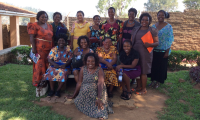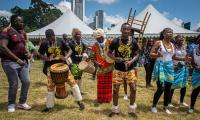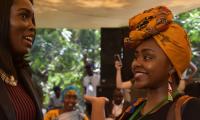Mentorordninger motiverer og styrker kvinders selvtillid
Mentoring is an exciting tool to inspire women to take active part in politics and transfer skills, knowledge and experience from one generation of women political leaders to the next. For this reason, mentorship is a key component our work with women in politics in Malawi.

Mentors at refresher training in Blantyre, Southern Region of Malawi
As a result of the mentorships, Malawian mentees gained confidence and were more motivated to run for seats in local politics. They also improved their communication skills and political understanding. Among other things, they engaged more with the community and the leadership of their political party on the importance of young women in politics. This feeds into a growing interest among young women in Malawi to take leadership positions within the parties and other developmental leadership positions within their communities.
Being shy does not necessarily stop you from becoming a prolific political campaigner. Elizabeth Chulu joined the mentorship programme for young women contesting as candidates for elections. As part of the programme, she participated in an exchanged visit to Denmark where he quietly observed and took mental notes. She decided to focus her own campaign on young people in her area. After a tough and dynamic campaign, she was elected as local councilor in Dowa District in May 2019.
Over the years, we have gained a lot of experience in using mentorships to support women in politics:
- Buy in from political leadership is key: The political leadership is instrumental in ensuring an environment where women and men participate equally. In cases where the political leadership did not buy into the mentorship initiatives there was some serious backlash. This was because they perceived the mentorships as a threat to their own position and thus tried to block it. Those blocking mentorship felt that the mentees would aspire to take up their positions in the party and possibly compete with them during conventions, primaries and in general elections. As a result, mobilization of mentees proved difficult when it lacked support from the top leadership.
- Inclusive structures are key: Without policies and strategies for changing discriminatory attitudes mentorships only have limited results. This is because the women continue to face the same challenges regardless of their capacity. Parties must have code of conducts, training plans, recruitment strategies for directory listing for young women or youth. Inclusion must be entrenched into party processes and systems as part of creating a culture.
- Violence against women remains a problem: If social and political structures are not inclusive it is likely to lead to frustration and in the worst case: violence. In 2019 political party primaries were characterized by large amounts of intimidation and insults (derogatory songs) to female aspirants. Unfortunately, many of these acts of intimidation were largely perpetrated by officials from the same party as the female candidates.
- Men should be involved in the programs: In Malawi, patriarchic traditions influence the roles, responsibilities, opportunities, privileges, attributes and statuses accorded to women and men. For this reason, men are often critical gatekeepers in opening spaces for young women’s participation in politics. Male champions should be engaged to address negative cultural practices and changing behaviors. Husbands must also be involved to avoid that husbands refuse their wives to participate in politics but instead help their wives in their political life.
- A generation gap should be considered: Young women should ideally be paired with fellow young women for ease of understanding of current challenges and political campaigning. In some cases, young women did not feel they could use the experience from elder women due to changes in society, e.g. after the introduction of social media. This is especially because young women often wish to explore new means to engage in politics. In some cases, an age gap resulted in a teacher-pupil relationship rather than experience sharing and guidance.
The partnership in Malawi was a collaboration between the Danish Socialist Peoples’ Party, the Danish Liberal Party through the Danish Liberal Democracy Programme and the Danish Institute for Parties and Democracy. In Malawi all the mentorship activities were implemented and facilitated by our partner, the Centre for Multiparty Democracy, Malawi.

This page is also available on the english site. Click on english in top menu.



